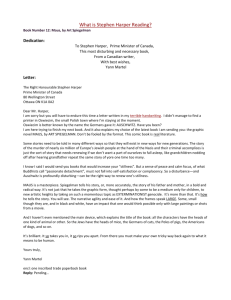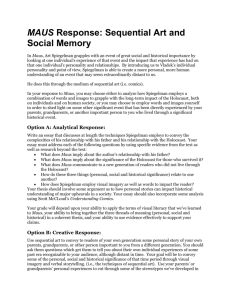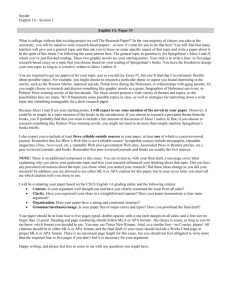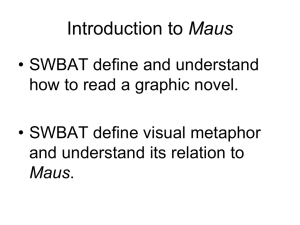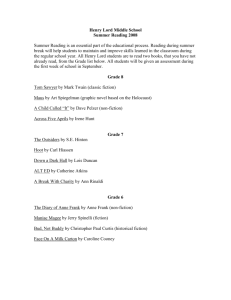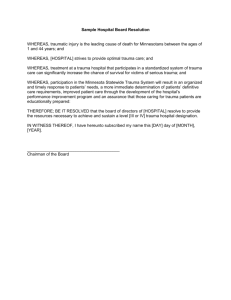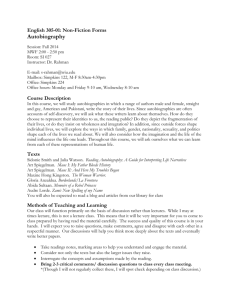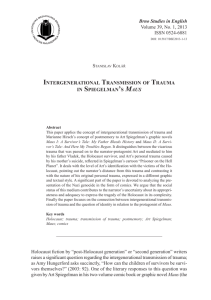00991K282100.doc
advertisement
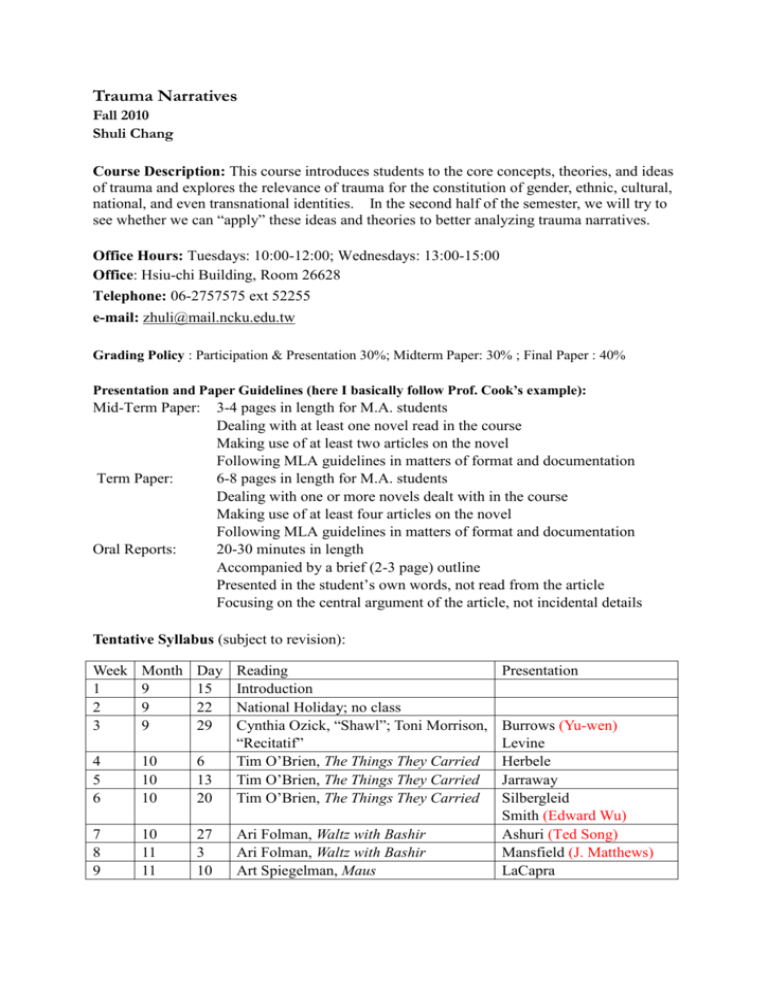
Trauma Narratives Fall 2010 Shuli Chang Course Description: This course introduces students to the core concepts, theories, and ideas of trauma and explores the relevance of trauma for the constitution of gender, ethnic, cultural, national, and even transnational identities. In the second half of the semester, we will try to see whether we can “apply” these ideas and theories to better analyzing trauma narratives. Office Hours: Tuesdays: 10:00-12:00; Wednesdays: 13:00-15:00 Office: Hsiu-chi Building, Room 26628 Telephone: 06-2757575 ext 52255 e-mail: zhuli@mail.ncku.edu.tw Grading Policy : Participation & Presentation 30%; Midterm Paper: 30% ; Final Paper : 40% Presentation and Paper Guidelines (here I basically follow Prof. Cook’s example): Mid-Term Paper: Term Paper: Oral Reports: 3-4 pages in length for M.A. students Dealing with at least one novel read in the course Making use of at least two articles on the novel Following MLA guidelines in matters of format and documentation 6-8 pages in length for M.A. students Dealing with one or more novels dealt with in the course Making use of at least four articles on the novel Following MLA guidelines in matters of format and documentation 20-30 minutes in length Accompanied by a brief (2-3 page) outline Presented in the student’s own words, not read from the article Focusing on the central argument of the article, not incidental details Tentative Syllabus (subject to revision): Week 1 2 3 Month 9 9 9 Day 15 22 29 4 5 6 10 10 10 6 13 20 Reading Introduction National Holiday; no class Cynthia Ozick, “Shawl”; Toni Morrison, “Recitatif” Tim O’Brien, The Things They Carried Tim O’Brien, The Things They Carried Tim O’Brien, The Things They Carried 7 8 9 10 11 11 27 3 10 Ari Folman, Waltz with Bashir Ari Folman, Waltz with Bashir Art Spiegelman, Maus Presentation Burrows (Yu-wen) Levine Herbele Jarraway Silbergleid Smith (Edward Wu) Ashuri (Ted Song) Mansfield (J. Matthews) LaCapra 10 11 17 Art Spiegelman, Maus 11 11 24 12 13 12 12 1 8 Art Spiegelman, Maus Mid-term paper due Kiran Desai, The Inheritance of Loss Kiran Desai, The Inheritance of Loss 14 15 12 12 15 22 16 12 29 17 18 1 1 5 12 Kiran Desai, The Inheritance of Loss Deepa Mehta, Earth (available on youtube) Deepa Mehta, Earth (available on youtube) Term Paper presentations Term Paper presentations Term paper due 1/13 Hirsch (Shu-hua Chen) Leventhal Sicher Huyssen (Ted Song) Ferguson (Shu-hua Chen) Scanlan (Edward Wu) Spielman Venn (Yu Wen) Herman Barenscott (J. Matthews) Ozick and Morrison Burrows, Victoria. “Conclusion: A Meditation on Silence,” Whiteness and Trauma: The Mother-Daughter Knot in the Fiction of Jean Rhys, Jamaica Kincaid, and Toni Morrison (New York: Palgrave, 2004), 160-171. Levine, Michael G. “‘Toward an Addressable You’: Ozick’s The Shawl and the Mouth of the Witness.” Teaching the Representation of the Holocaust. Ed. Marianne Hirsch & Irene Kacandes. New York: MLA, 2004. 396-411. Rosenberg, Meisha. “Cynthia Ozick’s Post-holocaust Fiction: Narration and Morality in the Midrashic Mode,” Journal of the Short Story in English 32 (1999): n.p. http://jsse.revues.org/index184.html. 11 September 2010. Tim O’Brien, The Things They Carried Gournelos, Ted. “Othering the Self: Dissonant Visual Culture and Quotidian Trauma in the Unites States Suburbia.” Cultural Studies 9.4 (2009): 509-32. Heberle, Mark A. “True War Stories.” A Trauma Artist: Tim O’Brien and the Fiction of Vietnam. Iowa City: U of Iowa P, 2001.177-215. Jarraway, David R. “‘Excremental Assault’ in Tim O’Brien: Trauma and Recovery in Vietnam War Literature.” Modern Fiction Studies 44.3 (1998): 695-711. Smith, Lorrie N. “‘The Things Men Do’: The Gendered Subtext in Tim O’Brien’s Esquire Stories.” Critique 36.1 (1994): 16-40. Ari Folman, Waltz With Bashir Ashuri, Tamar. “I Witness: Re-presenting Trauma in and by Cinema,” The Communication Review 13.3 (2010): 171-92. Mansfield, Natasha. “Loss and Mourning Cinema’s ‘Language’ of Trauma in Waltz With Bashir,” Wide Screen 1.2 (2010): 1-14. http://widescreenjournal.org 11 September 2010. Art Spiegelman, Maus Dominick LaCapra: "'Twas the Night before Christmas: Art Spiegelman's Maus", in: Dominick LaCapra, History and Memory after Auschwitz, Ithaca and London: Cornell University Press, 1998, 139-179. Efraim Sicher, “The Future of the Past: Countermemory and Postmemory in Contemporary Post-holocaust Narratives,” History & Memory 12.2 (2000): 56-91. Hirsch, Marianne. “Family Pictures: Maus, Mourning, and Post-Memory.” Discourse 15.2 (Winter 1992-93): 3-29. Reprinted in her Family Frames: Photography, Narrative, and Postmemory. Cambridge: Harvard UP, 1997. Huyssen, Andrea. “Of Mice and Mimesis: Reading Spiegelman with Adorno,” New German Critique 81 (2000): 65-82. Landsberg, Alison. “America, the Holocaust, and the Mass Culture of Memory: Toward a Radical Politics of Empathy.” New German Critique 71(Spring-Summer 1997): 63-86. Leventhal, Robert S. “Art Spiegelman’s MAUS: Working-Through the Trauma of the Holocaust,” http://www2.iath.virginia.edu/holocaust/spiegelman.html Levine, Michael G. "Necessary Stains: Art Spiegelman's Maus and the Bleeding of History." Considering Maus: Approaches to Art Spiegelman's 'Survivor's Tale' of the Holocaust. Ed. Deborah R. Geis. Tuscaloosa: U of Alabama P, 2003. 63-104. Kiran Desai, The Inheritance of Loss Ferguson, Jesse Patrick. “Violent Dis-Placements: Natural and Human Violence in Kiran Desai's The Inheritance of Loss,” The Journal of Commonwealth Literature 44.2 (2009): 35-49. Scanlan, Margaret. "Migrating from Terror: The Postcolonial novel after September 11," Journal of Postcolonial Writing 46.3 (2010). 11 Sep. 2010 Spielman, David Wallace. “‘Solid Knowledge’ and Contradictions in Kiran Desai’s The Inheritance of Loss,” Critique 51 (2010):74–89. Venn, Couze. “Identity, Diasporas and Subjective Change: The Role of Affect, the Relation to the Other, and the Aesthetic,” Subjectivity 26 (2009) 26: 3–28. Deepa Mehta’s Earth Herman, Jeanette. “Memory and Melodrama: The Translational Politics of Deepa Mehta’s Earth,” Camera Obscura 20.1 (2005): 117-47. Barenscott, Dorothy. “‘This is our Holocaust’: Deepa Mehta’s Earth and the Question of Partition Trauma,” Mediascape Spring 2006, http://www.tft.ucla.edu/mediascape/Spring06_ThisIsOurHolocaust.html
